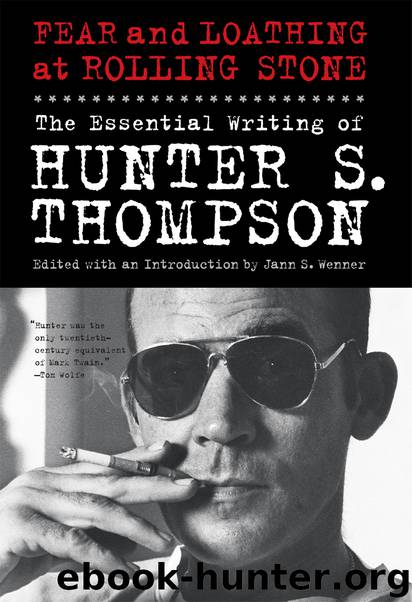Fear and Loathing at Rolling Stone by Hunter S. Thompson

Author:Hunter S. Thompson
Language: eng
Format: epub, mobi
Publisher: Simon & Schuster
Crazy? Tex Colson?
Never in hell. “He’s the meanest man in American politics,” says Nixon’s speechwriter Pat Buchanan, smiling lazily over the edge of a beer can beside the pool outside his Watergate apartment. Buchanan is one of the few people in the Nixon administration with a sense of humor. He is so far to the right that he dismisses Tex Colson as a “Massachusetts liberal.” But for some reason, Buchanan is also one of the few people—perhaps the only one—on Nixon’s staff who has friends at the other end of the political spectrum. At one point during the campaign I mentioned Buchanan at McGovern headquarters, for some reason, and Rick Stearns, perhaps the most hardline left-bent ideologue on McGovern’s staff, sort of chuckled and said, “Oh yeah, we’re pretty good friends. Pat’s the only one of those bastards over there with any principles.” When I mentioned this to another McGovern staffer, he snapped: “Yeah, maybe so . . . like Joseph Goebbels had principles.”
My own relationship with Buchanan goes back to the New Hampshire primary in 1968 when Nixon was still on the dim fringes of his political comeback. We spent about eight hours one night in a Boston hotel room, finishing off a half gallon of Old Crow and arguing savagely about politics: as I recall, I kept asking him why a person who seemed to have good sense would be hanging around with Nixon. It was clear even then that Buchanan considered me stone crazy, and my dismissal of Nixon as a hopeless bum with no chance of winning anything seemed to amuse him more than anything else.
About eight months later, after one of the strangest and most brutal years in American history, Richard Nixon was president and Pat Buchanan was one of his top two speechwriters along with Ray Price, the house moderate. I didn’t see Pat again until the McGovern campaign in ’72 when Ron Ziegler refused to have me on the Nixon press plane, and Buchanan intervened to get me past the White House guard and into what turned out to be a dull and useless seat on the plane with the rest of the White House press corps. It was also Buchanan who interviewed Garry Wills, introducing him into the Nixon campaign of 1968—an act of principle that resulted in an extremely unfriendly book called Nixon Agonistes.
So it seemed entirely logical, I thought—going back to Washington in the midst of this stinking Watergate summer—to call Buchanan and see if he felt like having thirteen or fourteen drinks on some afternoon when he wasn’t at the White House working feverishly in what he calls “the bunker.” Price and Buchanan write almost everything Nixon says, and they are busier than usual these days, primarily figuring out what not to say. I spent most of one Saturday afternoon with Pat lounging around a tin umbrella table beside the Watergate pool and talking lazily about politics in general. When I called him at the White House the day before, the first thing he said was “Yeah, I just finished your book.
Download
Fear and Loathing at Rolling Stone by Hunter S. Thompson.mobi
This site does not store any files on its server. We only index and link to content provided by other sites. Please contact the content providers to delete copyright contents if any and email us, we'll remove relevant links or contents immediately.
Hit Refresh by Satya Nadella(9128)
When Breath Becomes Air by Paul Kalanithi(8434)
The Girl Without a Voice by Casey Watson(7888)
A Court of Wings and Ruin by Sarah J. Maas(7823)
Do No Harm Stories of Life, Death and Brain Surgery by Henry Marsh(6940)
Shoe Dog by Phil Knight(5261)
The Rules Do Not Apply by Ariel Levy(4961)
A Higher Loyalty: Truth, Lies, and Leadership by James Comey(4958)
Hunger by Roxane Gay(4924)
Tuesdays with Morrie by Mitch Albom(4777)
Everything Happens for a Reason by Kate Bowler(4734)
The Immortal Life of Henrietta Lacks by Rebecca Skloot(4582)
Millionaire: The Philanderer, Gambler, and Duelist Who Invented Modern Finance by Janet Gleeson(4473)
How to Change Your Mind by Michael Pollan(4355)
All Creatures Great and Small by James Herriot(4314)
The Money Culture by Michael Lewis(4201)
Man and His Symbols by Carl Gustav Jung(4132)
Elon Musk by Ashlee Vance(4123)
Tokyo Vice: An American Reporter on the Police Beat in Japan by Jake Adelstein(3989)
